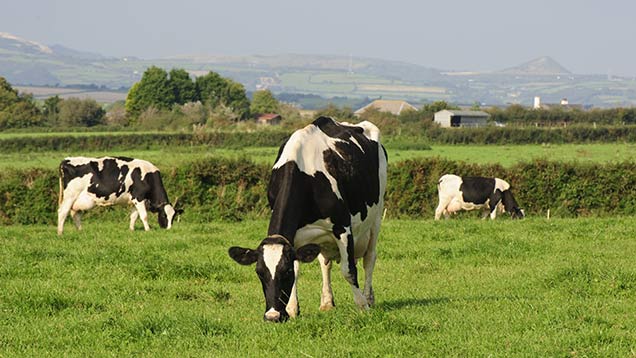Milk price slump forces Cornish dairy leader to quit farming
 ©Image Broker/Rex Shutterstock
©Image Broker/Rex Shutterstock A prominent dairy farmer from Cornwall has sparked shock in the sector by announcing he is selling his herd and quitting agriculture.
Mark Oliver who is the NFU south-west dairy board chairman has revealed that he is dispersing his family’s herd of 370 pedigree Holstein Friesian cows and giving up the tenancy at Lanhydrock dairies near Bodmin.
Mr Oliver said he and his family had come to the decision after watching the milk price paid by Trewithen Dairy fall from 33-34p/litre a year ago to 25p/litre today, with the prospect of further drops.
As a tenant, with rent to pay, he did not feel he could continue in those circumstances.
See also: Read more milk price stories
“We’ve been working at ways to save costs, but we’ve ended up thinking we’re better to get out,” he said.
“I’m going to be sorry to say goodbye and I sometime feel very sad, but it is almost a relief too. I know the strain of making it work at these prices is over.
“If there was an immediate hope of prices jumping up, then maybe we would think differently. But I don’t see any immediate improvements.”
Mr Oliver said the final decision was made last week and they had started telling people at the Royal Cornwall Show.
The cows will be sold in August and the family, which includes his wife, three children, sister, brother-in-law and nephew, will leave the farm in September.
Mr Oliver, who is 41, said he had been working on the family farm since he left school at 16, so the decision to leave was “momentous” for them all.
They had looked to see if alternative enterprises were an option, but couldn’t find a viable solution, given all other sectors were under pressure too.
If there was no improvement in the milk price, others would be going into autumn questioning what they were doing too, he warned.
This was partly behind his decision to go sooner, rather than later, he said.
As their assets were tied up in livestock they wanted to go before cows prices started to dip, which was a possibility if dairy farmers became increasingly short of cash to buy cows.
While nothing could be done to address the problem of global prices, Mr Oliver said retailers had to “stop and think” about the consequences of what they were doing to the dairy industry.
“If milk continues to sell for 89p for four pints then it is going to be hard for farmers to ever make money,” he warned.

